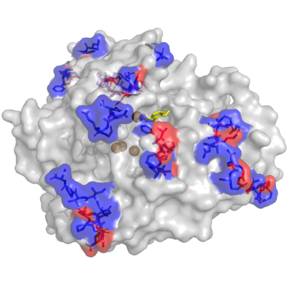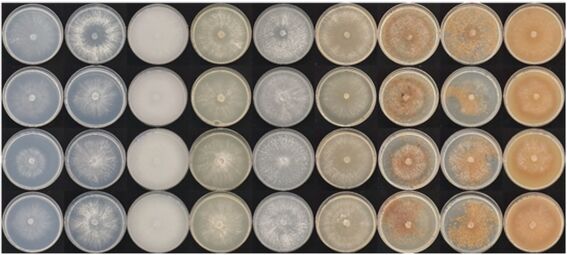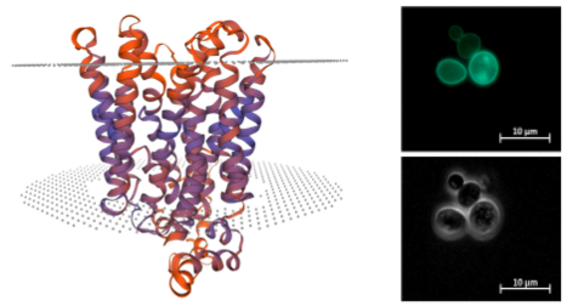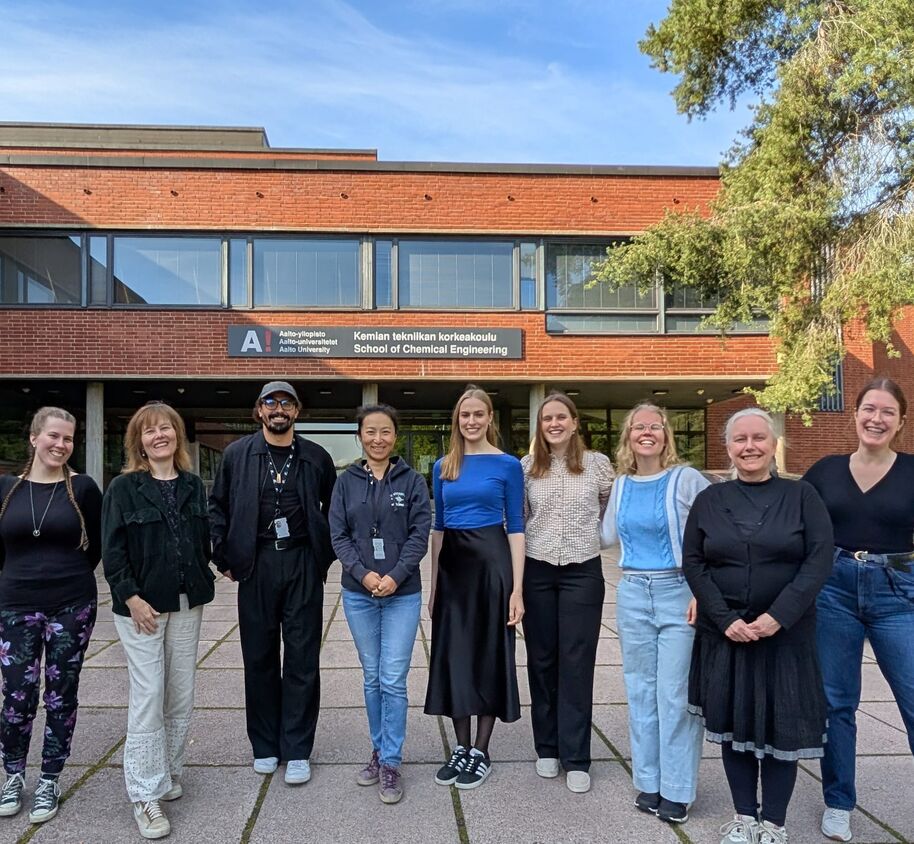Tania Chroumpi, Astrid Müller, Mao Peng, Mar Cubertorer Navarro, Robin Kuijpers, Agata Terebieniec, Jiajia Li, Lye Meng Markillie, Hugh D. Mitchell, Carrie D. Nicora, Chelsea M. Hutchinson, Vanessa Paurus, Samuel O. Purvine, Chaevien S. Clendinen, Galya Orr, Scott E. Baker, Miia R. Mäkelä, Ronald P. de Vries
2025
Current Research in Microbial Sciences
Ronald P. de Vries, Scott E. Baker, Mao Peng, Miia R. Mäkelä
2025
ACS Sustainable Resource Management
Jiali Meng, Astrid Müller, Jiajia Li, Vivien Bíró, Alexandra Márton, Erzsébet Fekete, Levente Karaffa, Miia R. Mäkelä, Ronald P. de Vries
2025
AIMS Microbiology
Astrid Müller, Miia R. Mäkelä, Ronald P. de Vries
2025
Advances in Applied Microbiology
Astrid Müller, Jiali Meng, Robin Kuijpers, Miia R. Mäkelä, Ronald P. de Vries
2025
Enzyme and Microbial Technology
J. L. Nybo, T. C. Vesth, S. Theobald, J. C. Frisvad, T. O. Larsen, Inge Kjaerboelling, K. Rothschild-Mancinelli, E. K. Lyhne, K. Barry, A. Clum, Y. Yoshinaga, L. Ledsgaard, C. Daum, A. Lipzen, A. Kuo, R. Riley, S. Mondo, K. LaButti, S. Haridas, J. Pangalinan, A. A. Salamov, B. A. Simmons, J. K. Magnuson, J. Chen, E. Drula, B. Henrissat, A. Wiebenga, R. J.M. Lubbers, A. Müller, A. C. dos Santos Gomes, M. R. Mäkelä, J. E. Stajich, I. V. Grigoriev, U. H. Mortensen, R. P. de Vries, S. E. Baker, M. R. Andersen
2025
Studies in Mycology
Agata Terebieniec, Li Xu, Mao Peng, Miia R. Mäkelä, Ronald P. de Vries
2025
Journal of Fungi
Agata Terebieniec, Astrid Müller, Tania Chroumpi, Jiajia Li, Mao Peng, Miia R. Mäkelä, Ronald P. De Vries
2025
Microbial Physiology
Sebastian Theobald, Tammi Vesth, Jane L. Nybo, Jens C. Frisvad, Inge Kjærbølling, Stephen Mondo, Kurt LaButti, Sajeet Haridas, Robert Riley, Alan A. Kuo, Asaf A. Salamov, Jasmyn Pangilinan, Anna Lipzen, Maxim Koriabine, Mi Yan, Kerrie Barry, Alicia Clum, Ellen K. Lyhne, Elodie Drula, Ad Wiebenga, Astrid Müller, Ronnie J.M. Lubbers, Roland S. Kun, Ana Carolina dos Santos Gomes, Miia R. Mäkelä, Bernard Henrissat, Blake A. Simmons, Jon K. Magnuson, Jakob B. Hoof, Uffe H. Mortensen, Paul S. Dyer, Michelle Momany, Thomas O. Larsen, Igor V. Grigoriev, Scott E. Baker, Ronald P. de Vries, Mikael R. Andersen
2025
Current Research in Microbial Sciences
R Baroncelli, JF Cobo-Díaz, T Benocci, E Battaglia, S Haridas, W Andreopoulos, K LaButti, J Pangilinan, A Lipzen, M Koriabine, D Bauer, G Le Floch, Miia Mäkelä, E Drula, B Henrissat, IV Grigoriev, JA Crouch, RP de Vries, SA Sukno, SA Thon
2024
GigaScience
Victor Manuel Gonzalez Ramos, Astrid Müller, Mao Peng, Megan Pawlowski, Anna Lipzen, Vivian Ng, Vasanth Singan, Mei Wang, Ronald de Vries, Igor Grigoriev, Joanna Kowalczyk, Miia Mäkelä
2024
Current Research in Biotechnology
Sebastian Theobald, Tammi C. Vesth, Elena Geib, Jane L. Nybo, Jens C. Frisvad, Thomas O. Larsen, Alan Kuo, Kurt LaButti, Ellen K. Lyhne, Inge Kjærbølling, Line Ledsgaard, Kerrie Barry, Alicia Clum, Cindy Chen, Matt Nolan, Laura Sandor, Anna Lipzen, Stephen Mondo, Jasmyn Pangilinan, Asaf Salamov, Robert Riley, Ad Wiebenga, Astrid Müller, Roland S. Kun, Ana Carolina dos Santos Gomes, Bernard Henrissat, Jon K. Magnuson, Blake A. Simmons, Miia R. Mäkelä, Uffe H. Mortensen, Igor V. Grigoriev, Matthias Brock, Scott E. Baker, Ronald P. de Vries, Mikael R. Andersen
2024
Journal of Fungi
Xing Wan, Sazzad Shahrear, Shea Wen Chew, Francisco Vilaplana, Miia R. Mäkelä
2024
Biotechnology for Biofuels and Bioproducts
Li Xu, Jiajia Li, Victor Manuel Gonzalez Ramos, Christina Lyra, Ad Wiebenga, Igor V. Grigoriev, Ronald P, de Vries, Miia Mäkelä, Mao Peng
2024
Bioresource Technology
Jiali Meng, Miia Mäkelä, Ronald de Vries
2023
Biomolecules
Astrid Müller, Li Xu, Claudia Heine, Tila Flach, Miia Mäkelä, Ronald P. de Vries
2023
Journal of Fungi
Miia Mäkelä, Hatice Böke, Ellisiv Nyhamar, Xing Wan
2023
Handbook of Biorefinery Research and Technology
Mao Peng, Sander Bervoets, Thommas Chin-A-Woeng, Zoraide Granchi, Kristiina Hilden, Miia R. Makela, Ronald P. de Vries
2023
Microbiological Research
Tania Chroumpi, Natalia Martínez-Reyes, Roland S. Kun, Mao Peng, Anna Lipzen, Vivian Ng, Sravanthi Tejomurthula, Yu Zhang, Igor V. Grigoriev, Miia R. Mäkelä, Ronald P. de Vries, Sandra Garrigues
2022
Fungal Genetics and Biology
Jiajia Li, Tania Chroumpi, Sandra Garrigues, Roland S. Kun, Jiali Meng, Sonia Salazar-Cerezo, Maria Victoria Aguilar-Pontes, Yu Zhang, Sravanthi Tejomurthula, Anna Lipzen, Vivian Ng, Chaevien S. Clendinen, Nikola Tolic, Igor Grigoriev, Adrian Tsang, Miia R. Mäkelä, Berend Snel, Mao Peng, Ronald P. de Vries
2022
Journal of Fungi
Mila Marinovic, Marcos Di Falco, Maria Victoria Aguilar Pontes, Andras Gorzsas, Adrian Tsang, Ronald de Vries, Miia Mäkelä, Kristiina Hilden
2022
Biomolecules
Jiali Meng, Zoltan Nemeth, Mao Peng, Erzsebet Fekete, Sandra Garrigues, Anna Lipzen, Vivian Ng, Emily Savage, Yu Zhang, Igor Grigoriev, Miia R. Mäkelä, Levente Karaffa, Ronald P. de Vries
2022
Microbial Biotechnology
Jiali Meng, Tania Chroumpi, Miia R. Mäkelä, Ronald P. de Vries
2022
Bioresource Technology
Peicheng Sun, Xinxin Li, Adiphol Dilokpimol, Bernard Henrissat, Ronald P. de Vries, Mirjam A. Kabel, Miia R. Mäkelä
2022
iScience
Felipe Andrés Venegas, Sanna Koutaniemi, Sandra M.J. Langeveld, Annie Bellemare, Sun-Li Chong, Adiphol Dilokpimol, Michael J. Lowden, Kristiina Hilden, Juan Francisco Leyva-Illades, Miia Mäkelä, Thi Thanh My Pham, Mao Peng, Mark A. Hancock, Yun Zheng, Adrian Tsang, Maija Tenkanen, Justin Powlowski, Ronald de Vries
2022
New Biotechnology
V. Viriato, M. R. Mäkelä, J. E. Kowalczyk, C. S. Ballarin, P. P. Loiola, M. C.N. Andrade
2022
Letters in Applied Microbiology
Tania Chroumpi, Mao Peng, Lye Meng Markillie, Hugh D. Mitchell, Carrie D. Nicora, Chelsea M. Hutchinson, Vanessa Paurus, Nikola Tolic, Chaevien S. Clendinen, Galya Orr, Scott E. Baker, Miia R. Mäkelä, Ronald P. de Vries
2021
Frontiers in Bioengineering and Biotechnology
Tania Chroumpi, Mao Peng, Maria Victoria Aguilar-Pontes, Astrid Mueller, Mei Wang, Juying Yan, Anna Lipzen, Vivian Ng, Igor V. Grigoriev, Miia R. Mäkelä, Ronald P. deVries
2021
Microbial Biotechnology
Sandra Garrigues, Roland Kun, Mao Peng, Birgit Gruben, Isabelle Benoit Gelber, Miia Mäkelä, Ronald de Vries
2021
Microbiology Spectrum
Jussi Kontro, Christina Lyra, Milla Koponen, Jaana Kuuskeri, Mika A. Kähkönen, Janne Wallenius, Xing Wan, Jussi Sipilä, Miia Mäkelä, Paula Nousiainen, Kristiina Hildén
2021
Frontiers in Bioengineering and Biotechnology
Joanna E. Kowalczyk, Shreya Saha, Miia R. Mäkelä
2021
Biomolecules
Ronnie J.M. Lubbers, Adiphol Dilokpimol, Jaap Visser, Kristiina S. Hildén, Miia R. Mäkelä, Ronald P. de Vries
2021
Applied and Environmental Microbiology
Jiali Meng, Miia Mäkelä, Ronald de Vries
2021
Advances in Applied Microbiology
Astrid Müller, Joanna Kowalczyk, Miia Mäkelä
2021
Encyclopedia of Mycology
Miia Mäkelä, Kristiina Hilden, Jaana Kuuskeri
2021
Encyclopedia of Mycology
Mao Peng, Claire Khosravi, Ronnie J.M. Lubbers, Roland S. Kun, Maria Victoria Aguilar Pontes, Evy Battaglia, Cindy Chen, Sacha Dalhuijsen, Paul Daly, Anna Lipzen, Vivian Ng, Juying Yan, Mei Wang, Jaap Visser, Igor V. Grigoriev, Miia R. Mäkelä, Ronald P. de Vries
2021
The Cell Surface
Agata Terebienic, Tania Chroumpi, Adiphol Dilokpimol, Maria Victoria Aguilar-Pontes, Miia Mäkelä, Ronald de Vries
2021
Biotechnology Reports
Janne Wallenius, Jussi Kontro, Christina Lyra, Jaana Kuuskeri, Xing Wan, Mika A. Kähkönen, Irshad Baig, Paul C.J. Kamer, Jussi Sipilä, Miia R. Mäkelä, Paula Nousiainen, Kristiina Hildén
2021
Microbial Biotechnology
Tania Chroumpi, Miia Mäkelä, Ronald de Vries
2020
Biotechnology Advances
Tania Chroumpi, Maria Victoria Aguilar-Pontes, Mao Peng, Mei Wang, Anna Lipzen, Vivian Ng, Igor Grigoriev, Miia R. Makela, Ronald P. de Vries
2020
Microbiological Research
Nancy Cononi Linares, Adiphol Dilokpimol, Henrik Stålbrand, Miia Mäkelä, Ronald de Vries
2020
Bioresource Technology
Paul Daly, Mao Peng, Hugh D. Mitchell, Young Mo Kim, Charles Ansong, Heather Brewer, Peter de Gijsel, Mary S. Lipton, Lye Meng Markillie, Carrie D. Nicora, Galya Orr, Ad Wiebenga, Kristiina S. Hildén, Mirjam A. Kabel, Scott E. Baker, Miia R. Mäkelä, Ronald P. de Vries
2020
Environmental Microbiology
Paul Daly, Mao Peng, Sara Casado López, Anna Lipzen, Vivian Ng, Vasanth Singan, Mei Wang, Igor Grigoriev, Ronald de Vries, Miia Mäkelä
2020
Journal of Biotechnology
Ronald de Vries, Miia R. Mäkelä
2020
Trends in Microbiology
Adiphol Dilokpimol, Mao Peng, Marcos Di Falco, Thomas Chin A Woeng, Rosa Maria Wilhelmina Hegi, Zoraide Granchi, Adrian Tsang, Kristiina S. Hildén, Miia R. Mäkelä, Ronald P. de Vries
2020
Bioresource Technology
Inge Kjaerbolling, Tammi Vesth, Jens C. Frisvad, Jane L. Nybo, Sebastian Theobald, Sara Kildgaard, Thomas Isbrandt Petersen, Alan Kuo, Atsushi Sato, Ellen K. Lyhne, Martin E. Kogle, Ad Wiebenga, Roland S. Kun, Ronnie J. M. Lubbers, Miia R. Makela, Kerrie Barry, Mansi Chovatia, Alicia Clum, Chris Daum, Sajeet Haridas, Guifen He, Kurt LaButti, Anna Lipzen, Stephen Mondo, Jasmyn Pangilinan, Robert Riley, Asaf Salamov, Blake A. Simmons, Jon K. Magnuson, Bernard Henrissat, Uffe H. Mortensen, Thomas O. Larsen, Ronald P. de Vries, Igor V. Grigoriev, Masayuki Machida, Scott E. Baker, Mikael R. Andersen
2020
Nature Communications
Jussi Kontro, Riku Maltari, Joona Mikkilä, Mika Kähkönen, Miia R. Mäkelä, Kristiina Hildén, Paula Nousiainen, Jussi Sipilä
2020
Frontiers in Bioengineering and Biotechnology
Roland S. Kun, Jiali Meng, Sonia Salazar-Cerezo, Miia R. Makela, Ronald P. de Vries, Sandra Garrigues
2020
Enzyme and Microbial Technology
Joona Mikkilä, Mikaela Trogen, Klaus A.Y. Koivu, Jussi Kontro, Jaana Kuuskeri, Riku Maltari, Zane Dekere, Marianna Kemell, Miia R. Mäkelä, Paula A. Nousiainen, Michael Hummel, Jussi Sipilä, Kristiina Hildén
2020
ACS Omega
Shingo Miyauchi, Hayat Hage, Elodie Drula, Laurence Lesage-Meessen, Jean-Guy Berrin, David Navarro, Anne Favel, Delphine Chaduli, Sacha Grisel, Mireille Haon, Francois Piumi, Anthony Levasseur, Anne Lomascolo, Steven Ahrendt, Kerrie Barry, Kurt M. LaButti, Didier Chevret, Chris Daum, Jerome Mariette, Christophe Klopp, Daniel Cullen, Ronald P. de Vries, Allen C. Gathman, Matthieu Hainaut, Bernard Henrissat, Kristiina S. Hilden, Ursula Kuees, Walt Lilly, Anna Lipzen, Miia Mäkelä, Angel T. Martinez, Melanie Morel-Rouhier, Emmanuelle Morin, Jasmyn Pangilinan, Arthur F. J. Ram, Han A. B. Woesten, Francisco J. Ruiz-Duenas, Robert Riley, Eric Record, Igor Grigoriev, Marie-Noelle Rosso
2020
DNA Research
Miia Mäkelä, Marja Tuomela, Annele Hatakka, Kristiina Hilden
2020
Laccases in Bioremediation and Waste Valorisation
Miia R. Mäkelä, Kristiina Hilden, Joanna E. Kowalczyk, Annele Hatakka
2020
Grand Challenges in Fungal Biotechnology
Sara Casado López, Mao Peng, Paul Daly, Bill Andreopoulos, Jasmyn Pangilinan, Anna Lipzen, Robert Riley, Steven Ahrendt, Vivian Ng, Kerrie Barry, Chris Daum, Igor V. Grigoriev, Miia Riitta Mäkelä, Ronald P. de Vries
2019
Microbiology Resource Announcements
Paul Daly, Mao Peng, Marcos Di Falco, Anna Lipzen, Mei Wang, Vivian Ng, Igor Grigoriev, Adrian Tsang, Miia R. Makela, Ronald P. de Vries
2019
Applied and Environmental Microbiology
Joanna Kowalczyk, Mao Peng, Megan Pawlowski, Anna Lipzen, Vivian Ng, Vasanth Singan, Mei Wang, Igor V. Grigoriev, Miia Mäkelä
2019
Frontiers in Bioengineering and Biotechnology
Roland Kun, Ana Carolina S. Gomes, Sari Kristiina Hilden, Sonia Salazar Cerezo, Miia Riitta Mäkelä, Ronald de Vries
2019
Biotechnology Advances
Nancy Coconi Linares, Marcos Di Falco, Isabelle Benoit-Gelber, Birgit S. Gruben, Mao Peng, Adrian Tsang, Miia R. Mäkelä, Ronald P. de Vries
2019
New Biotechnology
Ronnie J. M. Lubbers, Adiphol Dilokpimol, Jaap Visser, Miia R. Makela, Kristiina S. Hilden, Ronald P. de Vries
2019
Biotechnology Advances
Ronnie J. M. Lubbers, Adiphol Dilokpimol, Mao Peng, Jaap Visser, Miia R. Makela, Kristiina S. Hilden, Ronald P. de Vries
2019
ACS Sustainable Chemistry & Engineering
Io Antonopoulou, Adiphol Dilokpimol, Laura Iancu, Miia R. Mäkelä, Simona Varriale, Gabriella Cerullo, Silvia Huttner, Stefan Uthoff, Peter Juetten, Alexander Piechot, Alexander Steinbuechel, Lisbeth Olsson, Vincenza Faraco, Kristiina S. Hilden, Ronald P. de Vries, Ulrika Rova, Paul Christakopoulos
2018
Catalysts
Paul Daly, Sara Casado López, Mao Peng, Christopher S. Lancefield, Samuel O. Purvine, Young Mo Kim, Erika M. Zink, Alice Dohnalkova, Vasanth R. Singan, Anna Lipzen, David Dilworth, Mei Wang, Vivian Ng, Errol Robinson, Galya Orr, Scott E. Baker, Pieter C.A. Bruijnincx, Kristiina S. Hildén, Igor V. Grigoriev, Miia R. Mäkelä, Ronald P. de Vries
2018
Environmental Microbiology
Ronald de Vries, Miia Riitta Mäkelä, Sari Kristiina Hilden, Jörg Kämper
2018
Fungal Genetics and Biology
Adiphol Dilokpimol, Miia Riitta Mäkelä, Simona Varriale, Miaomiao Zhou, Gabriella Cerullo, Loknath Gidijala, Harri Tapio Hinkka, Joana L.A. Brás, Peter Jütten, Alexander Piechot, Raymond Verhaert, Sari Kristiina Hilden, Vincenza Faraco, Ronald de Vries
2018
New Biotechnology
Adiphol Dilokpimol, Miia R. Mäkelä, Gabriella Cerullo, Miaomiao Zhou, Simona Varriale, Loknath Gidijala, Joana L.A. Brás, Peter Jütten, Alexander Piechot, Raymond Verhaert, Vincenza Faraco, Kristiina S. Hilden, Ronald P. de Vries
2018
New Biotechnology
Kristiina Hildén, Miia R. Mäkelä
2018
Reference Module in Life Sciences
Jussi Heikki Samuli Kontro, Paula Annukka Nousiainen, Mika Antero Kähkönen, Uula T Hyväkkö, Joona Aleksi Mikkilä, Miia Riitta Mäkelä, Sari Kristiina Hilden, Antti Jussi Sipilä
2018
Jussi Heikki Samuli Kontro, Paula Annukka Nousiainen, Mika Antero Kähkönen, Joona Aleksi Mikkilä, Miia Riitta Mäkelä, Sari Kristiina Hilden, Antti Jussi Sipilä
2018
Mika Antero Kähkönen, Paula Annukka Nousiainen, Jussi Heikki Samuli Kontro, Mila Marinovic, Irshad Baig, Paul Kamer, Antti Jussi Sipilä, Miia Riitta Mäkelä, Sari Kristiina Hilden
2018
Sara Casado Lopez, Mao Peng, Tedros Yonatan Issak, Paul Daly, Ronald P. de Vries, Miia R. Mäkelä
2018
Applied and Environmental Microbiology
Taina Lundell, Miia Mäkelä
2018
Sienten biologia
Mila Marinovic, Maria Victoria Aguilar-Pontes, Miaomiao Zhou, Otto Kullervo Miettinen, Ronald de Vries, Miia Riitta Mäkelä, Sari Kristiina Hilden
2018
Fungal Genetics and Biology
Mila Marinović, Paula Nousiainen, Adiphol Dilokpimol, Jussi Kontro, Robin Moore, Jussi Sipilä, Ronald P. De Vries, Miia R. Mäkelä, Kristiina Hildén
2018
ACS Sustainable Chemistry & Engineering
Joona Aleksi Mikkilä, Jaana Tuulia Kuuskeri, Miia Riitta Mäkelä, Zane Dekere, Jussi Heikki Samuli Kontro, Paula Annukka Nousiainen, Antti Jussi Sipilä, Sari Kristiina Hilden
2018
Miia R. Mäkelä, Adiphol Dilokpimol, Salla M. Koskela, Jaana Kuuskeri, Ronald P. de Vries, Kristiina Hilden
2018
Microbial Biotechnology
Miia Riitta Mäkelä, Mao Peng, Zoraide Granchi, Thomas Chin-A-Woeng, Rosa Hegi, Sake van Pelt, Steven Ahrendt, Robert Riley, Matthieu Heinaut, Bernard Henrissat, Igor Grigoriev, Ronald de Vries, Sari Kristiina Hilden
2018
Genome Announcements
Miia Riitta Mäkelä, Sari Kristiina Hilden
2018
Fungal Genomics
Miia Riitta Mäkelä, M. Di Falco, E. McDonnell, T.T.M. Nguyen, A. Wiebenga, Sari Kristiina Hilden, M. Peng, I.V. Grigoriev, A. Tsang, R.P. de Vries
2018
Studies in Mycology
Miia R. Mäkelä, Maria Victoria Aguilar-Pontes, Diana van Rossen-Uffink, Mao Peng, Ronald P. de Vries
2018
Scientific Reports
Mao Peng, Maria Victoria Aguilar-Pontes, Matthieu Hainaut, Bernard Henrissat, Kristiina Hilden, Miia R. Mäkelä, Ronald P. de Vries
2018
Fungal Genetics and Biology
Mao Peng, Maria V. Aguilar-Pontes, Ronald P. de Vries, Miia R. Mäkelä
2018
Frontiers in Microbiology
María Victoria Aguilar Pontes, Aleksandrina Patyshakuliyeva, Harm Post, Edita Jurak, Kristiina Hildén, Maarten Altelaar, Albert Heck, Mirjam A. Kabel, Ronald P. de Vries, Miia R. Mäkelä
2018
Fungal Genetics and Biology
Andrew Urquhart, Stephen Mondo, Miia Riitta Mäkelä, James Hane, Ad Wiebenga, Guifen He, Sirma Mihaltcheva, Jasmyn Pangilinan, Anna Lipzen, Kerrie Barry, Ronald de Vries, Igor V. Grigoriev, Alexander Idnurm
2018
Frontiers in Microbiology
Tammi C. Vesth, Jane L. Nybo, Sebastian Theobald, Jens C. Frisvad, Thomas O. Larsen, Kristian F. Nielsen, Jakob B. Hoof, Julian Brandl, Asaf Salamov, Robert Riley, John M. Gladden, Pallavi Phatale, Morten T. Nielsen, Ellen K. Lyhne, Martin E. Kogle, Kimchi Strasser, Erin McDonnell, Kerrie Barry, Alicia Clum, Cindy Chen, Kurt LaButti, Sajeet Haridas, Matt Nolan, Laura Sandor, Alan Kuo, Anna Lipzen, Matthieu Hainaut, Elodie Drula, Adrian Tsang, Jon K. Magnuson, Bernard Henrissat, Ad Wiebenga, Blake A. Simmons, Miia R. Mäkelä, Ronald P. de Vries, Igor V. Grigoriev, Uffe H. Mortensen, Scott E. Baker, Mikael R. Andersen
2018
Nature Genetics
Paul Daly, Gillian G. Slaghek, Sara Casado Lopez, Ad Wiebenga, Kristiina S. Hilden, Ronald P. de Vries, Miia R. Mäkelä
2017
Journal of Microbiological Methods
Ronald P. de Vries, Robert Riley, Ad Wiebenga, Guillermo Aguilar-Osorio, Sotiris Amillis, Christiane Akemi Uchima, Gregor Anderluh, Mojtaba Asadollahi, Marion Askin, Kerrie Barry, Evy Battaglia, Özgür Bayram, Tiziano Benocci, Susanna A. Braus-Stromeyer, Camila Caldana, David Cánovas, Gustavo C. Cerqueira, Fusheng Chen, Wanping Chen, Cindy Choi, Alicia Clum, Renato Augusto Corrêa dos Santos, André Ricardo de Lima Damásio, George Diallinas, Tamás Emri, Erzsébet Fekete, Michel Flipphi, Susanne Freyberg, Antonia Gallo, Christos Gournas, Rob Habgood, Matthieu Hainaut, María Laura Harispe, Bernard Henrissat, Sari Kristiina Hilden, Ryan Hope, Abeer Hossain, Eugenia Karabika, Levente Karaffa, Zsolt Karányi, Nada Kraševec, Alan Kuo, Harald Kusch, Kurt LaButti, Ellen L. Lagendijk, Alla Lapidus, Anthony Levasseur, Erika Lindquist, Anna Lipzen, Antonio F. Logrieco, Andrew MacCabe, Miia Riitta Mäkelä, Iran Malavazi, Petter Melin, Vera Meyer, Natalia Mielnichuk, Márton Miskei, Ákos P. Molnár, Giuseppina Mulé, Chew Yee Ngan, Margarita Orejas, Erzsébet Orosz, Jean Paul Ouedraogo, Karin M. Overkamp, Hee-Soo Park, Giancarlo Perrone, Francois Piumi, Peter J. Punt, Arthur F. J. Ram, Ana Ramón, Stefan Rauscher, Eric Record, Diego Mauricio Riaño-Pachón, Vincent Robert, Julian Röhrig, Roberto Ruller, Asaf Salamov, Nadhira S. Salih, Rob A. Samson, Erzsébet Sándor, Manuel Sanguinetti, Tabea Schütze, Kristina Sepčić, Ekaterina Shelest, Gavin Sherlock, Vicky Sophianopoulou, Fabio M. Squina, Hui Sun, Antonia Susca, Richard B. Todd, Adrian Tsang, Shiela E. Unkles, Nathalie van de Wiele, Diana van Rossen-Uffink, Juliana Velasco de Castro Oliveira, Tammi C. Vesth, Jaap Visser, Jae-Hyuk Yu, Miaomiao Zhou, Mikael R. Andersen, David B. Archer, Scott E. Baker, Isabelle Benoit, Axel A. Brakhage, Gerhard H. Braus, Reinhard Fischer, Jens C. Frisvad, Gustavo H. Goldman, Jos Houbraken, Berl Oakley, István Pócsi, Claudio Scazzocchio, Bernhard Seiboth, Patricia A. vanKuyk, Jennifer Wortman, Paul S. Dyer, Igor V. Grigoriev
2017
Genome Biology
Adiphol Dilokpimol, Miia R. Mäkelä, Sadegh Mansouri, Olga Belova, Martin Waterstraat, Mirko Bunzel, Ronald P. de Vries, Kristiina S. Hilden
2017
New Biotechnology
Zoraide Granchi, Mao Peng, Thomas Chi-A-Woeng, Ronald P. de Vries, Kristiina Hilden, Miia Riitta Mäkelä
2017
Genome Announcements
Birgit S. Gruben, Miia R. Mäkelä, Joanna E. Kowalczyk, Miaomiao Zhou, Isabelle Benoit-Gelber, Ronald P. De Vries
2017
BMC Genomics
Mirjam A. Kabel, Edita Jurak, Miia R. Mäkelä, Ronald P. De Vries
2017
Applied Microbiology & Biotechnology
Sara Casado López, Bart Theelen, Serena Manserra, Tedros Yonatan Issak, Johanna Rytioja, Miia R. Mäkelä, Ronald P. De Vries
2017
IMA Fungus
Miia R. Mäkelä, Ourdia Bouzid, Diogo Robl, Harm Post, Mao Peng, Albert Heck, Maarten Altelaar, Ronald P. de Vries
2017
New Biotechnology
Mao Peng, Adiphol Dilokpimol, Miia R. Mäkelä, Kristiina Hildén, Sander Bervoets, Robert Riley, Igor V. Grigoriev, Matthieu Hainaut, Bernard Henrissat, Ronald P. de Vries, Zoraide Granchi
2017
Journal of Biotechnology
Johanna Rytioja, Kristiina Hildén, Marcos Di Falco, Miaomiao Zhou, Maria Victoria Aguilar-Pontes, Outi Maaria Sietiö, Adrian Tsang, Ronald P. de Vries, Miia R. Mäkelä
2017
Environmental Microbiology
Sara Casado López, Outi-Maaria Sietiö, Sari Kristiina Hilden, Ronald de Vries, Miia Riitta Mäkelä
2016
Gene expression systems in fungi: advancements and applications
Ronald P. de Vries, Joost van den Brink, Kristiina S. Hilden, Miia R. Mäkelä, Henrik Stålbrand
2016
Handbook of Carbohydrate-Modifying Biocatalysts
Ronald P. de Vries, Aleksandrina Patyshakuliyeva, Harm Post, Miaomiao Zhou, Edita Jurak, Albert Heck, Sari Kristiina Hilden, Mirjam Kabel, Miia Riitta Mäkelä, Maarten Altelaar
2016
Science and Cultivation of Edible Fungi
Adiphol Dilokpimol, Miia Riitta Mäkelä, Maria Victoria Aguilar-Pontes, Isabelle Benoit-Gelber, Sari Kristiina Hilden, Ronald de Vries
2016
Biotechnology for Biofuels
Otto Miettinen, Robert Riley, Kerrie Barry, Dan Cullen, Ronald P. de Vries, Matthieu Hainaut, Annele Hatakka, Bernard Henrissat, Kristiina Hildén, Rita Kuo, Kurt LaButti, Anna Lipzen, Miia R. Mäkelä, Laura Sandor, Joseph W. Spatafora, Igor V. Grigoriev, David S. Hibbett
2016
Genome Announcements
Miia Riitta Mäkelä, EL Bredeweg, JK Magnuson, SE Baker, Ronald de Vries, Sari Kristiina Hilden
2016
Microbiology Spectrum
Miia R. Mäkelä, Sadegh Mansouri, Ad Wiebenga, Johanna Rytioja, Ronald P. de Vries, Kristiina S. Hildén
2016
NEW BIOTECHNOLOGY
Miia Riitta Mäkelä, Luis Alexis Jimenez Barboza, Ronald de Vries, Sari Kristiina Hilden
2016
Aspergillus and Penicillium in the post-genomic era
Isabelle Benoit, Helena Culleton, Miaomiao Zhou, Marcos DiFalco, Guillermo Aguilar-Osorio, Evy Battaglia, Ourdia Bouzid, Carlo P.J.M. Brouwer, Hala B.O. El-Bushari, Pedro M. Coutinho, Birgit S. Gruben, Kristiina S. Hildén, Jos Houbraken, Luis Alexis Jiménez Barboza, Anthony Levasseur, Eline Majoor, Miia R. Mäkelä, Hari Mander Narang, Blanca Trejo-Aguilar, Joost Van Den Brink, Patricia A. VanKuyk, Ad Wiebenga, Vincent McKie, Barry McCleary, Adrian Tsang, Bernard Henrissat, Ronald P. De Vries
2015
Biotechnology for Biofuels
Jaana Tuulia Kuuskeri, Miia Riitta Mäkelä, Jarkko Mikael Isotalo, Ilona Maria Oksanen, Taina Kristina Lundell
2015
BMC Microbiology
Maija Kymäläinen, Miia Mäkelä, Kristiina Hildén, Jussi Kukkonen
2015
European Journal of Wood and Wood Products
Lene Lange, Bryndís Björnsdóttir, Asbjorn Brandt, Sari Kristiina Hilden, Gudmundur Óli Hreggvidsson, Birgitte Jacobsen, Amialie Jessen, Eva Nordberg Karlsson, Jane Lindedam, Miia Riitta Mäkelä, Sigrún Elsa Smáradóttir, Janus Vang, Alexander Wentzel
2015
Miia R. Mäkelä, Mila Marinović, Paula Nousiainen, April J.M. Liwanag, Isabelle Benoit, Jussi Sipilä, Annele Hatakka, Ronald P. de Vries, Kristiina S. Hildén
2015
Advances in Applied Microbiology
Aleksandrina Patyshakuliyeva, Harm Post, Miaomiao Zhou, Edita Jurak, Albert J R Heck, Kristiina S. Hildén, Mirjam A. Kabel, Miia R. Mäkelä, Maarten A F Altelaar, Ronald P. De Vries
2015
Environmental Microbiology
Johanna Rytioja, Kristiina Hildén, Susanna Mäkinen, Jari Vehmaanperä, Annele Hatakka, Miia R. Mäkelä
2015
PloS One
Outi-Maaria Sietiö, Miia Riitta Mäkelä, Sari Kristiina Hilden
2015
Current Biotechnology
Kristiina Hilden, Miia Mäkelä, Kari Steffen, Martin Hofrichter, Annele Hatakka, David Archer, Taina Lundell
2014
Fungal Genetics and Biology
Taina K. Lundell, Miia R. Mäkelä, Ronald P. de Vries, Kristiina S. Hilden
2014
Advances in Botanical Research
Miia R. Makela, Outi-Maaria Sietiö, Ronald P. de Vries, Sari Timonen, Kristiina Hilden
2014
PloS One
Miia Mäkelä, Kristiina Hilden, Ronald de Vries
2014
Fungal genomics
Miia Riitta Mäkelä, Nicole Donofrio, Ronald de Vries
2014
Fungal Genetics and Biology
Miia Mäkelä, Nicole Donofrio, Ronald de Vries
2014
Fungal Genetics and Biology
Aleksandrina Patyshakuliyeva, Miia Mäkelä, Outi-Maaria Sietiö, Ronald de Vries, Kristiina Hilden
2014
Fungal Genetics and Biology
Johanna Rytioja, Kristiina Hildén, Jennifer Yuzon, Annele Hatakka, Ronald P. De Vries, Miia R. Mäkelä
2014
Microbiology and Molecular Biology Reviews
Johanna Rytioja, Kristiina Hildén, Annele Hatakka, Miia R. Mäkelä
2014
Fungal Genetics and Biology
Heikki Salavirta, Ilona Oksanen, Jaana Kuuskeri, Miia Makela, Pia Laine, Lars Paulin, Taina Lundell
2014
PloS One
Aniko Varnai, Miia R. Mäkelä, Demi T. Djajadi, Jenni Rahikainen, Annele Hatakka, Liisa Viikari
2014
Advances in Applied Microbiology
Kristiina Hilden, Miia Mäkelä, Pauliina Lankinen, Taina Lundell
2013
Fungal Genetics and Biology
Kristiina Hilden, Miia Mäkelä, Taina Lundell, Jaana Tuulia Kuuskeri, Alexey Chernykh, Ludmila Golovleva, David Archer, Annele Hatakka
2013
Applied Microbiology & Biotechnology
Miia Mäkelä, Taina Lundell, Annele Hatakka, Kristiina Hilden
2013
Fungal Biology
Paula Annukka Nousiainen, Jussi Kontro, Helmiina Manner, Johanna Rytioja, Miia Mäkelä, Pekka Maijala, Taina Lundell, Annele Hatakka, Jussi Sipilä
2013
Aleksandrina Patyshakuliyeva, Edita Jurak, Annegret Kohler, Adam Baker, Evy Battaglia, Wouter De Bruijn, Kerry S. Burton, Michael P. Challen, Pedro M. Coutinho, Daniel C. Eastwood, Birgit S. Gruben, Miia R. Mäkelä, Francis Martin, Marina Nadal, Joost van den Brink, Ad Wiebenga, Miaomiao Zhou, Bernard Henrissat, Mirjam Kabel, Harry Gruppen, Ronald P. De Vries
2013
BMC Genomics
Paula Annukka Nousiainen, Jussi Heikki Samuli Kontro, Maija Helmiina Manner, Miia Riitta Mäkelä, Sari Kristiina Hilden, Pekka Mikael Maijala, Taina Kristina Lundell, Annele Inkeri Hatakka, Antti Jussi Sipilä
2012
OxiZymes 16.-19.9. 2012, proceedings book p. 123. Poster
Paula Annukka Nousiainen, Jussi Kontro, Helmiina Manner, Miia Mäkelä, Kristiina Hilden, Pekka Maijala, Taina Lundell, Annele Hatakka, Jussi Sipilä
2012
EWLP 2012
Kristiina Hilden, Taina Lundell, Miia Mäkelä, Johanna Rytioja, Paula Annukka Nousiainen, Jussi Sipilä, A Chernykh, L Golovleva, D Archer, Annele Hatakka
2010
1st Symposium on Biotechnology Applied to Lignocelluloses, Lignobiotech One
Kristiina Hilden, Taina Lundell, Miia Mäkelä, Johanna Rytioja, Paula Annukka Nousiainen, Jussi Sipilä, D Archer, A Chernykh, L Golovleva, Annele Hatakka
2010
Oxidative enzymes as sustainable industrial biocatalysts (OESIB)
Taina K. Lundell, Miia R. Makela, Kristiina Hilden
2010
Journal of Basic Microbiology
Miia Riitta Mäkelä, Kristiina Hilden, Taina K. Lundell
2010
Applied Microbiology & Biotechnology
Miia R. Makela, Kristiina Hilden, Annele Hatakka, Taina K. Lundell
2009
Microbiology
Kristiina Hilden, Miia R Mäkelä, Terhi K Hakala, Annele Hatakka, Taina Lundell
2006
Current Genetics
Miia R Mäkelä, Kristiina Hilden, Terhi K. Hakala, Annele Hatakka, Taina K Lundell
2006
Current Genetics
Kristiina Hilden, Miia Mäkelä, Annele Hatakka, Taina Lundell
2004
Oxizymes in Naples
M Makela, S Galkin, A Hatakka, T Lundell
2002
Enzyme and Microbial Technology
More information on our research in the Aalto research portal.
Research portal










